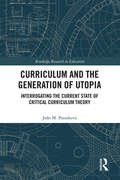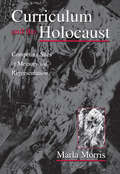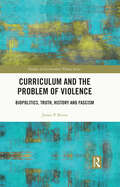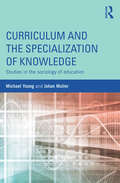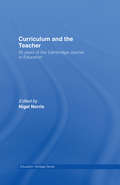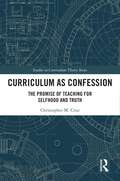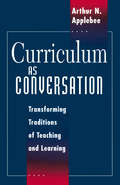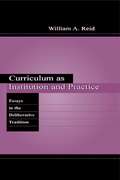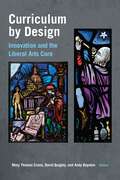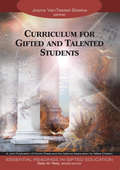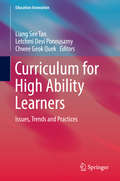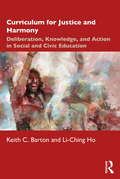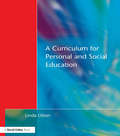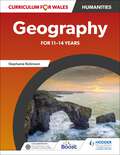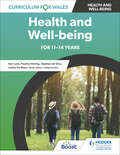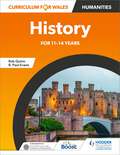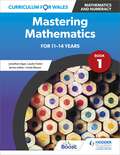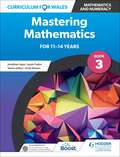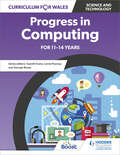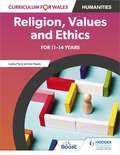- Table View
- List View
Curriculum and the Generation of Utopia: Interrogating the Current State of Critical Curriculum Theory (Routledge Research in Education)
by João M. ParaskevaAs a follow-up to Towards a Just Curriculum Theory and Curriculum Epistemicide , this volume illuminates the challenges and contradictions which have prevented critical curriculum theory from establishing itself as an alternative to dominant Western Eurocentric epistemologies. Curriculum and the Generation of Utopia re-visits the work of leading progressive theorists and draws on a complex range of epistemological perspectives from the Middle East, Africa, Southern Europe, and Latin America. Paraskeva illustrates how counter-dominant narratives have been suppressed by neoliberal dynamics through an exploration of key issues including: itinerant curriculum theory, globalization and internationalization, as well as utopianism. Foregrounding critical curriculum theory as a vector of de-colonization and de-centralization, the text puts forth Itinerant Curriculum Theory (ITC) as an alternative form of anti-colonial, theoretical engagement. This work forms an important addition to the literature surrounding critical curriculum theory. It will be of interest to post-graduate scholars, researchers and academics in the fields of curriculum studies, curriculum theory, and critical educational research.
Curriculum and the Holocaust: Competing Sites of Memory and Representation (Studies in Curriculum Theory Series)
by Marla MorrisIn this book, Morris explores the intersection of curriculum studies, Holocaust studies, and psychoanalysis, using the Holocaust to raise issues of memory and representation. Arguing that memory is the larger category under which history is subsumed, she examines the ways in which the Holocaust is represented in texts written by historians and by novelists. For both, psychological transference, repression, denial, projection, and reversal contribute heavily to shaping personal memories, and may therefore determine the ways in which they construct the past. The way the Holocaust is represented in curricula is the way it is remembered. Interrogations of this memory are crucial to our understandings of who we are in today's world. The subject of this text--how this memory is represented and how the process of remembering it is taught--is thus central to education today.
Curriculum and the Problem of Violence: Biopolitics, Truth, History and Fascism (Studies in Curriculum Theory Series)
by James P. BurnsThis book is a genealogical inquiry into the present problem of violence, in the US and internationally, through the lens of curriculum theory. It explores a constellation of problems including war, authoritarianism, post-truth, social disparities, and increasingly onerous surveillance technologies. Arguing that the current problem of violence is neither new, nor aberrant, the author historicises the conditions of possibility that have produced the violence that presently confronts our world. Seemingly disparate issues such as ethnonationalism, authoritarian populism, Christian nationalism, neoliberalism, the proliferation of sophisticated surveillance technologies, and military Keynesianism are traced to historical features such as ‘Ur-Fascism,’ white supremacy, corporate capitalism, religious extremism, propaganda and public relations, institutional power, and the biopolitical ‘death function’ endemic in modern societies. Through a sweeping, powerful, and in-depth analysis of violence in its genealogical trajectories in global setting, it promises to re-examine curriculum in a different light and open up new possibilities. As such, the book is an important curriculum study which supports curricular ethics as articulated by Bill Pinar, such as the situation of the self socially and historically, the reconstruction of one’s understanding of the self and the world, and the potential reconstruction of the social world as more peaceful and just. Significantly, the book contributes to a retheorisation of Foucault’s biopolitics as affirmative biopower imbued with ethics of truth-seeking as a technology of the self. It will appeal to scholars and students of curriculum studies with interests in curriculum theory, authoritarianism, non-violence studies, justice studies, ethnonationalism and technologies of the self.
Curriculum and the Specialization of Knowledge: Studies in the sociology of education
by Michael Young Johan MullerThis book presents a new way for educators at all levels - from early years to university - to think about curriculum priorities. It focuses on the curriculum as a form of specialised knowledge, optimally designed to enable students to gain access to the best knowledge available in any field. Papers jointly written by the authors over the last eight years are revised for this volume. It draws on the sociology of knowledge and in particular the work of Emile Durkheim and Basil Bernstein, opening up the possibilities for collaborative inter-disciplinary enquiry with historians, philosophers and psychologists. Although primarily directed to researchers, university teachers and graduate students, its arguments about specialised knowledge have profound implications for policy makers.
Curriculum and the Teacher: 35 years of the Cambridge Journal of Education (Education Heritage)
by Nigel NorrisEven though the curriculum can be tightly specified and controlled by strong accountability mechanisms, it is teachers who decisively shape the educational experiences of children and young people at school. Bringing together seminal papers from the Cambridge Journal of Education around the theme of curriculum and the teacher, this book explores the changing conceptions of curriculum and teaching and the changing role of the teacher in curriculum development and delivery. The book is organised around three major themes: Taking its lead from Lawrence Stenhouse, Part One looks at ‘defining the curriculum problem’ from a variety of perspectives and includes papers from some of the most influential curriculum theorists over the last thirty years. Part Two explores the framing of new orders of educational experience. It has papers from leading educational thinkers who have contributed to debates about how to make education more inclusive, humane, liberating, creative and educational. Part Three is focused on teachers and teaching. It offers a selection of papers from significant scholars in the field reflecting on the experience of teaching and how it is personally as well as socially constructed and theorised. The papers are drawn from important and eventful periods of educational history spanning the curriculum reform movement of the 1960s and 1970s to the present age of surveillance, accountability and control. A specially written Introduction contextualises the papers. Part of the Routledge Education Heritage series, Curriculum and the Teacher presents landmark texts from the Cambridge Journal of Education, offering a wealth of material for students and researchers in education.
Curriculum as Confession: The Promise of Teaching for Selfhood and Truth (ISSN)
by Christopher M. CruzThis book offers a philosophical inquiry into the idea of curriculum as confession and considers how it can help us answer questions of justice, selfhood, and truth. It connects the field of curriculum studies and continental philosophy in order to arrive at new ways of thinking through the concept and act of confession. Utilising a phenomenological and deconstructive approach to thinking about curriculum, the author draws upon scholars including William Pinar, Jacques Derrida, Madeleine Grumet, and Michel Foucault to act as interlocutors for a re-thinking of Pinar’s statement that “we need educational confession.” The chapters argue that confession communicates the interplay between thinking, translation, and transformation, showing how confession can be conceived of as educative in both instrumental and existential ways. An innovative study that explores confession in both “religious” and “secular” senses, and conceptualises curriculum as a theological and phenomenological text, it uniquely explores what confession can reveal, how we tell the truth without violating the other, and how one does justice to the world they experience. It will appeal to scholarly audiences with interests in curriculum studies, teacher education, philosophy of education, religious studies, religious education, and theology.
Curriculum as Conversation: Transforming Traditions of Teaching and Learning
by Arthur N. Applebee“Applebee's central point, the need to teach 'knowledge in context,' is absolutely crucial for the hopes of any reformed curriculum. His experience and knowledge give his voice an authority that makes many of the current proposals on both the left and right seem shallow by comparison. ”—Gerald Graff, University of Chicago
Curriculum as Conversation: Transforming Traditions of Teaching and Learning
by Arthur N. Applebee“Applebee's central point, the need to teach 'knowledge in context,' is absolutely crucial for the hopes of any reformed curriculum. His experience and knowledge give his voice an authority that makes many of the current proposals on both the left and right seem shallow by comparison.”—Gerald Graff, University of Chicago
Curriculum as Institution and Practice: Essays in the Deliberative Tradition (Studies in Curriculum Theory Series)
by William A. ReidThis volume brings together a collection of essays by William A. Reid that present and elaborate the deliberative tradition of curriculum theory, and examine the implications of a deliberative perspective for approaches to policy making and school systems. The essays illustrate the development of Reid's understanding of the deliberative tradition and his efforts to extend it from a focus on practice to one that embraces conceptions of schooling as an institution. Institution and practice are the key concepts which guide and illuminate the central thesis of the book: To be effective, a theory of curriculum must be able to talk not only about questions of desirable practice, but also about questions of how practice may be aided or constrained by the nature of the institution within which it takes place. This significant new contribution to the literature of curriculum studies: *represents a unique attempt to synthesize what have often been treated as quite separate issues: questions of the philosophical basis for curriculum decision making, questions of processes of decision making, and questions of the nature of schools and classrooms; *presents its material in an evolutionary way, focusing on the continuing development of ideas, rather than on a "rhetoric of conclusions"; and *offers a summing up of thought and achievement in the deliberative tradition that is not otherwise available.
Curriculum by Design: Innovation and the Liberal Arts Core
by Mary Thomas Crane, David Quigley & Andy BoyntonThis book tells the story of how a team of colleagues at Boston College took an unusual approach (working with a design consultancy) to renewing their core and in the process energized administrators, faculty, and students to view liberal arts education as an ongoing process of innovation. It aims to provide insight into what they did and why they did it and to provide a candid account of what has worked and what has not worked. Although all institutions are different, they believe their experiences can provide guidance to others who want to change their general education curriculum or who are being asked to teach core or general education courses in new ways.The book also includes short essays by a number of faculty colleagues who have been teaching in BC’s new innovative core courses, providing practical advice about the challenges of trying interdisciplinary teaching, team teaching, project-or problem-based learning, intentional reflection, and other new structures and pedagogies for the first time. It will also address some of the nuts and bolts issues they have encountered when trying to create structures to make curriculum change sustainable over time and to foster ongoing innovation.
Curriculum for Gifted and Talented Students
by Sally M. Reis Joyce Lenore VanTassel-BaskaThis ready reference offers decision makers the tools they need to shape a successful and enriching curriculum for gifted students.
Curriculum for High Ability Learners: Issues, Trends and Practices (Education Innovation Series)
by Liang See Tan Letchmi Devi Ponnusamy Chwee Geok QuekGiven the increasing speed of change and the information explosion around the world, this book draws attention to the practice of teaching for conceptual understanding, which has been heralded as an effective approach within many curriculum frameworks. This book is pivotal in documenting and analyzing efforts in creating concept-based curriculum and pedagogies for high ability learners. Contributors of this book discuss key concepts and trends in their curriculum development efforts for high ability learners, as well as the challenges and solutions in their work. Drawing from a wide group of educators - practitioners, curriculum writers, administrators and researchers - this book has assembled together a range of perspectives on the processes, outcomes and implications of using concept-based curriculum and pedagogies in a dynamic educational landscape. These informed perspectives highlighted by the contributors will prove insightful and inspirational to practitioners, policy makers and other stakeholders alike.
Curriculum for Justice and Harmony: Deliberation, Knowledge, and Action in Social and Civic Education
by Keith C. Barton Li-Ching HoBarton and Ho present a global vision of social and civic education, one that reorients the field toward justice and harmony. Drawing from diverse philosophical and cultural traditions, as well as empirical research, they introduce curriculum principles designed to motivate and inform students’ thoughtful and compassionate deliberation of public issues. This book argues that the curriculum must prepare young people to take action on issues of justice and harmony—societal ideals that are central to all communities. Effective action depends on deliberation characterized by emotional commitment, collaborative problem-solving, and engagement with diverse perspectives and forms of expression. Deliberation for public action also requires knowledge—of people’s lives and experiences, their insights into social issues, and strategies for advancing justice and harmony. These curriculum principles are illustrated through case studies of public housing, food insecurity, climate change, gender bias, public health, exploitation of domestic workers, incarceration of racialized minorities, the impact of development and environmental change on Indigenous communities, and other pressing global concerns. For additional resources and related information, please visit the authors’ website, www.justiceandharmony.com.
Curriculum for Personal and Social Education
by Linda OttenFirst Published in 1999. Routledge is an imprint of Taylor & Francis, an informa company.
Curriculum for Wales: Geography for 11–14 years
by David Gardner Stephanie Robinson Catherine Owen Jo Coles John LyonEmbodying the aims of the new curriculum for Wales, and forming part of the Humanities Area of Learning and Experience, Curriculum for Wales: Geography for 11-14 years will help you plan your curriculum, offering 18 chapters packed full of geographical resources, including maps, charts, diagrams and data.>> Build students' curiosity about the world around them - how it developed, what it is like now, and what it could be like in the future by helping you develop an enquiry-based approach to learning.>> Explore geography at a local, national and global scale and foster students' sense of cynefin with a focus on Wales and its place on the wider world.>> Develop core geographical skills with fieldwork enquiries embedded into the context of topics, encouraging students to investigate their local area.>> Support teachers in planning and assessment with suggested learning objectives.>> Help students to consider topics in the context of their own lives and the local area in which they live with regular 'My place' activities.>> Encourage students to think about the impact of human actions in their local area, on Wales and the world, to develop ethical informed citizens.>> Choose from crucial content areas including: weather and climate; ecosystems; landscapes and national parks; rural and urban places; sport and culture; climate change; disease; global consumers and more.
Curriculum for Wales: Health and Wellbeing Boost
by Stephen De Silva Pauline Stirling Lesley de MezaHelp students understand the importance of health and well-being and develop their motivation, resilience, empathy and decision-making abilities in order to become healthy, capable and confident members of society.This accessible eBook supports the new Curriculum for Wales, providing inspiring ideas and engaging content to enable flexible delivery of the Health and Well-being Area of Learning and Experience.- Develop your new curriculum with confidence: the content in eBook is underpinned by the four purposes and 'what matters' statements for the Health and Well-being AoLE, as well as the statutory RSE guidance- Introduce difficult topics with ease: learning outcomes and starter activities at the beginning of every section provide an easy way into each topic- Encourage active learning and engaging discussions: build students' understanding with source-based activities to support an activity-based learning scheme that is accessible to students of all abilities- Embed teamwork and physical health activities into lessons: ideas to build physical health and encourage students to work together are included throughout, to help students develop an understanding of how health and well-being are interconnectedBoost eBooks are interactive, accessible and flexible. They use the latest research and technology to provide the very best experience for students and teachers.
Curriculum for Wales: Health and Wellbeing Boost
by Stephen De Silva Pauline Stirling Lesley de MezaHelp students understand the importance of health and well-being and develop their motivation, resilience, empathy and decision-making abilities in order to become healthy, capable and confident members of society.This accessible eBook supports the new Curriculum for Wales, providing inspiring ideas and engaging content to enable flexible delivery of the Health and Well-being Area of Learning and Experience.- Develop your new curriculum with confidence: the content in eBook is underpinned by the four purposes and 'what matters' statements for the Health and Well-being AoLE, as well as the statutory RSE guidance- Introduce difficult topics with ease: learning outcomes and starter activities at the beginning of every section provide an easy way into each topic- Encourage active learning and engaging discussions: build students' understanding with source-based activities to support an activity-based learning scheme that is accessible to students of all abilities- Embed teamwork and physical health activities into lessons: ideas to build physical health and encourage students to work together are included throughout, to help students develop an understanding of how health and well-being are interconnectedBoost eBooks are interactive, accessible and flexible. They use the latest research and technology to provide the very best experience for students and teachers.
Curriculum for Wales: History for 11–14 years
by R. Paul Evans Rob QuinnTell the story of Wales over the last 1000 years, as you discover how Welsh history, cynefin, culture and language are connected, from the past to the present.Underpinned by the four purposes of the new Curriculum for Wales, this book empowers pupils with the knowledge and skills that they need for learning, life and work.> Design a curriculum that is unique to your school. Use the content flexibly to craft a historical education that reflects your pupils and your local area, as well as covering 'What matters' statements within the Humanities AoLE.> Follow an enquiry-based approach. Starting in early medieval times, this book establishes a strong chronological spine, with later enquiries looking at changes in Wales thematically.> Develop analytical and evaluative skills. A wide range of sources and interpretations encourage pupils to think like historians, using evidence to consider change and continuity, cause and consequence.> Put progression at the heart of the curriculum. End-of-topic Activities build towards more in-depth end-of-enquiry Review and Research tasks. All activities and tasks enable each pupil to move through their individual learning journey towards their next 'Progression step'.> Explore the rich history of Wales and the global context. Understanding events and issues in Wales and the wider world - and the development of Wales as a multicultural society - will help pupils to become ethical, informed citizens.
Curriculum for Wales: History for 11–14 years
by R. Paul Evans Rob QuinnTell the story of Wales over the last 1000 years, as you discover how Welsh history, cynefin, culture and language are connected, from the past to the present.Underpinned by the four purposes of the new Curriculum for Wales, this book empowers pupils with the knowledge and skills that they need for learning, life and work.> Design a curriculum that is unique to your school. Use the content flexibly to craft a historical education that reflects your pupils and your local area, as well as covering 'What matters' statements within the Humanities AoLE.> Follow an enquiry-based approach. Starting in early medieval times, this book establishes a strong chronological spine, with later enquiries looking at changes in Wales thematically.> Develop analytical and evaluative skills. A wide range of sources and interpretations encourage pupils to think like historians, using evidence to consider change and continuity, cause and consequence.> Put progression at the heart of the curriculum. End-of-topic Activities build towards more in-depth end-of-enquiry Review and Research tasks. All activities and tasks enable each pupil to move through their individual learning journey towards their next 'Progression step'.> Explore the rich history of Wales and the global context. Understanding events and issues in Wales and the wider world - and the development of Wales as a multicultural society - will help pupils to become ethical, informed citizens.
Curriculum for Wales: Mastering Mathematics for 11-14 years: Book 1
by Jonathan Agar Laszlo FedorCreate confident and capable mathematicians with accessible explanations and engaging activities.This book gradually builds on prior knowledge to deepen understanding through clear explanations, worked examples and hundreds of differentiated questions, as well as class activities.Designed to be used flexibly, this scheme covers the four 'what matters' statements and follows the five principles of progression from the Curriculum for Wales.- Develop pupils' conceptual understanding and communication with symbols throughout using plenty of worked examples and banded questions that get progressively more difficult- Target key skills using the fluency, logical reasoning and strategic competence markers- Engage pupils with a range of whole-class activities, including manipulatives and the 'concrete, pictorial, abstract' approach- Ease the transition between progression steps with skill-checker activities at the start of each topic and review questions after each chapter - Link topics to other areas of learning, such as Science and Technology, with cross-curricular activities and discussion points
Curriculum for Wales: Mastering Mathematics for 11-14 years: Book 2
by Jonathan Agar Laszlo FedorCreate confident and capable mathematicians with accessible explanations and engaging activities.This book gradually builds on prior knowledge to deepen understanding through clear explanations, worked examples and hundreds of differentiated questions, as well as class activities that you can choose from to build your lessons and teaching plan.Designed to be used flexibly, this scheme covers the four 'what matters' statements and follows the five principles of progression from the Curriculum for Wales.- Develop pupils' conceptual understanding and communication with symbols throughout using plenty of worked examples and banded questions that get progressively more difficult- Target fluency, logical reasoning and strategic competence by using the markers included in each exercise question- Improve outcomes by selecting from banded questions most suited to enable progression- Ease the transition between progression steps with skill-checker activities at the start of each topic and review questions after each chapter - Link topics to other areas of learning, such as Science and Technology, with cross-curricular activities and discussion points
Curriculum for Wales: Mastering Mathematics for 11-14 years: Book 3
by Jonathan Agar Laszlo FedorCreate confident and capable mathematicians with accessible explanations and engaging activities.This book gradually builds on prior knowledge to deepen understanding through clear explanations, worked examples and hundreds of differentiated questions, as well as a range of activities that you can choose from to build your lessons and teaching plans. Designed to be used flexibly, this scheme covers the four 'what matters' statements and follows the five principles of progression from the Curriculum for Wales.- Develop pupils' conceptual understanding and communication with symbols throughout using plenty of worked examples and banded questions that get progressively more difficult- Target fluency, logical reasoning and strategic competence by using the markers included in each exercise question- Improve outcomes by selecting from banded questions most suited to enable progression- Ease the transition between progression steps with skill-checker activities at the start of each topic and review questions after each chapter - Link topics to other areas of learning, such as Science and Technology, with cross-curricular activities and discussion points- Improve pupils' understanding of maths in finance with a dedicated chapter and financial contexts highlighted throughout
Curriculum for Wales: Progress in Computing for 11-14 years
by Gareth Evans George Rouse Lorne PearceyConfidently deliver Computing for the new Curriculum for Wales and develop students' ICT skills with the interactive, accessible, and flexible Progress in Computing: Boost eBook.Reboot your Computing classroom with this all-in-one textbook, informed by the new curriculum progression steps, that will inspire you to deliver creative Computing lessons with confidence.Boost knowledge and skills in bite-sized chunks: every double-page spread contains a lesson's worth of targeted content and activitiesChallenge students to think creatively about what they are learning and how it can be applied in the real worldEmpower and encourage students to think take charge of their own progression, with regular knowledge check-ins and activitiesPrepare for the new curriculum with informed coverage of the Computing What Matters statement: 'Computation is the foundation for our digital world'
Curriculum for Wales: Progress in Computing for 11-14 years
by Gareth Evans George Rouse Lorne PearceyConfidently deliver Computing for the new Curriculum for Wales and develop students' ICT skills with the interactive, accessible, and flexible Progress in Computing: Boost eBook.Reboot your Computing classroom with this all-in-one textbook, informed by the new curriculum progression steps, that will inspire you to deliver creative Computing lessons with confidence.Boost knowledge and skills in bite-sized chunks: every double-page spread contains a lesson's worth of targeted content and activitiesChallenge students to think creatively about what they are learning and how it can be applied in the real worldEmpower and encourage students to think take charge of their own progression, with regular knowledge check-ins and activitiesPrepare for the new curriculum with informed coverage of the Computing What Matters statement: 'Computation is the foundation for our digital world'
Curriculum for Wales: Religion, Values and Ethics
by Jan Hayes Lesley ParryConfidently deliver Religion, Values and Ethics and encourage students to understand and appreciate diverse worldviews, both in Wales and the wider world.This book supports the new Curriculum for Wales for 11-14 years, ensuring that students continually develop their knowledge and skills as they become informed, self-aware and responsible citizens.- Easily design your own curriculum: pick-and-choose from topics that cover the major world faiths and non-religious belief groups, as well as the values and ethical content outlined in the Humanities AoLE- Understand religious and non-religious worldviews and their historical impact: examine the influence of institutional and personal religious and non-religious worldviews on Wales and the wider world throughout history- Bring the content to life in your classroom: explore the beliefs and practices of people living today in Wales and the wider world through real-life accounts and case studies- Encourage critical thinking: each lesson tackles a 'big question' for students to consider, as well as activities designed to allow them to formulate and express their own perspectives and a range of sources to engage them with ethical and moral issues- Develop students' sense of self and their understanding of societal challenges: explore key concepts in the context of different religious and ethical worldviews, including cynefin, identity, relationships, community, equality, sustainability, freedom, good and evil, and more
